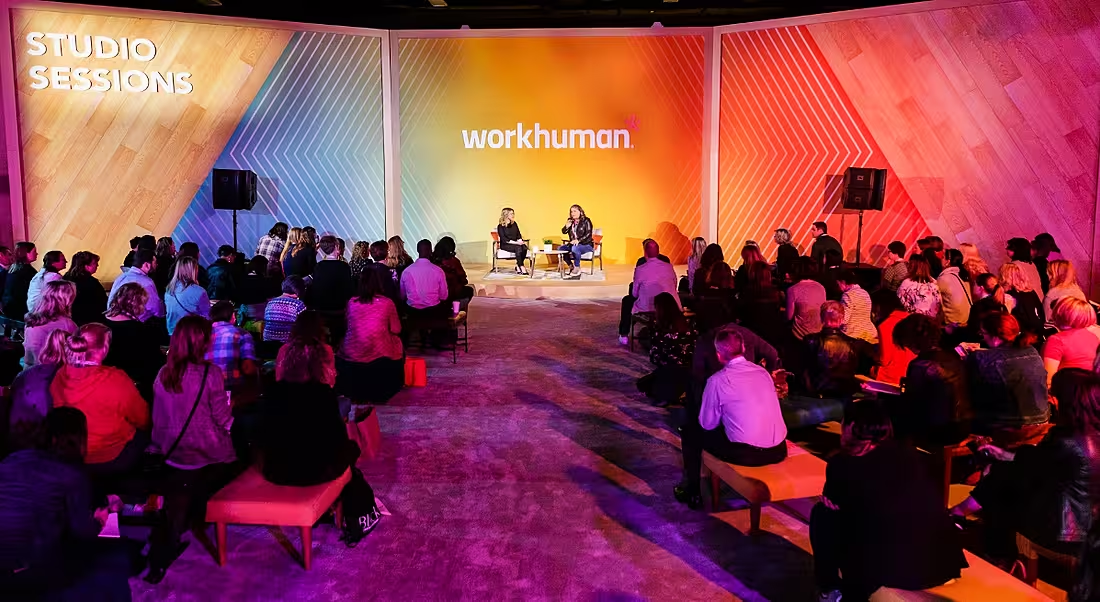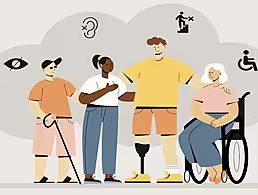Careers editor Jenny Darmody headed to Workhuman 2019 in Nashville. Here are some of her key takeaways from the conference.
Despite the funny side of Workhuman’s Derek Irvine greeting attendees by saying “Hello, humans!” every morning, it was clear throughout the fifth Workhuman conference that the world of work must be reminded that workers are human beings.
While there is plenty of evolving technology within the HR industry, including Workhuman’s own social recognition platform, the overriding theme of the conference was very much focused on the human elements of working life. These are the processes that need attention, with or without technology.
Workhuman featured headline speakers such as Viola Davis, Geena Davis and George Clooney speaking about the importance of respecting one another, being on the right side of history when it comes to equality and eradicating unconscious bias in the workplace.
These themes bled into the rest of the conference and it was clear both from the keynotes and the breakout sessions that the future of HR needs to be more focused on addressing the human side of the workplace. Here are some of my key takeaways from the event.
1. How important recognition is at work
As a company that has a social recognition platform in its product suite, it’s no surprise that recognition, appreciation and gratitude at work were central themes at the Workhuman conference. And the research is undoubtedly there.
Whether you have a software platform or not, the importance of recognition is critical for employee engagement and happiness. Numerous studies have shown this, including a Gallup study that says employees who are not adequately recognised are twice as likely to leave within a year.
In spite of all the HR tech options to improve processes, including recognition software, the simple act of ensuring employees are appreciated is an incredibly low-cost, high-impact solution to employee disengagement.
2. More work to be done on sexual harassment
It’s been about a year and a half since the #MeToo movement took off, but the conversation is thankfully showing no signs of slowing down as Workhuman hosted several different sessions on harassment in the workplace.
A particularly interesting session came from Dr Katherine Smith who, having had personal experience with sexual harassment in the workplace, discussed the lingering effects of harassment long after the incident has occurred, such as depression, PTSD and sleep disorders. Furthermore, Smith cited a study from the US Equal Employment Opportunity Commission that said 75pc of those who experienced workplace harassment also experienced retaliation when they spoke up.
It has never been more important for both HR professionals and managers to not just firm up their policies on workplace harassment but also examine their company culture in terms of fostering a safe environment for those to speak up.
3. A lot of bureaucracy needs to be thrown out
In case it wasn’t already clear, reminding employers that they employ human beings was somewhat of a tongue-in-cheek but necessary reminder throughout the conference.
There are a lot of bureaucratic processes in place that can have a knock-on effect for how managers and HR professionals treat their employees. Humans are incredibly unique, and therefore there will always be a lot of exceptional circumstances, grey areas and unusual situations that may lead bureaucratic HR processes to create harrowing blockages.
This became most clear to me when I attended a session by grief and trauma consultant Jennifer Crow along with senior HR business partner Stephanie Blakey. The session was around the topic of what to do when a co-worker dies, drawing on a very sombre personal experience at Blakey’s own company, the Cadmus Group.
Bereavement leave, if your company even has it, is traditionally between three and five days for family members. Even at that, it is often immediate family only and that leave is only given in the immediate aftermath. This very rigid process does not account for delayed grief, grief for someone incredibly close who is not a family member or even the varying length of time grief can take. This was just one example highlighted at the conference proving that many rigid business practices need to be changed to allow for the infinite grey areas that come with working alongside human beings.
4. HR trends will move towards human practices rather than tech
When the topic of the future of work came into mainstream conversations a few years ago, the big question was around job security: will a robot replace me?
As time moved on, it became more about the skills we will need to stay relevant – namely, soft skills and those that are ‘uniquely human’.
When we look at the future of work from the HR industry’s perspective, we’ve seen exciting developments in HR technology that will improve and streamline recruitment processes, reduce unconscious bias, and employ new systems that will have the employees’ wellbeing in mind.
A major takeaway from Workhuman this year is an even stronger move towards improving human practices that have a lot less to do with HR technology.
The technology will continue to evolve and grow in the background, and companies all over the world will continue to implement it. However, the overwhelming majority of sessions at this year’s conference addressed the core human needs of employees without technology.
How can we treat our employees better? How do we ensure they are engaged and happy? What human-centric processes do we need to improve to prevent harassment, improve equality and show compassion? These are the key questions Workhuman wanted to answer this year, constantly reminding attendees multiple times a day that it’s important to remember that they work with human beings.




